WMG News
Widening participation work experience week connects under-represented aspiring engineers with industry giants
The University of Warwick's commitment to widening participation and fostering inclusivity took centre stage during a week-long programme aimed at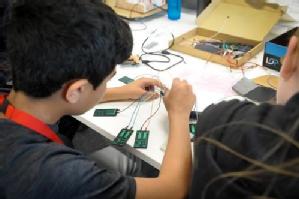 inspiring 30 students from local schools to pursue careers in engineering. The initiative was organised by WMG at the University of Warwick and the University's Widening Participation Team which wanted to support under-represented students that might lack confidence or support when they consider a future in engineering.
inspiring 30 students from local schools to pursue careers in engineering. The initiative was organised by WMG at the University of Warwick and the University's Widening Participation Team which wanted to support under-represented students that might lack confidence or support when they consider a future in engineering.
Throughout the programme, participants gained valuable insights into various engineering pathways and learnt more about research and careers at WMG alongside partners like Tata Motors. WMG research and teaching staff mentored the students, providing them with a taste of what studying engineering involves through an engineering project.
Laboratory and workshop tours, facilitated by WMG apprentices and Tata Motors, gave participants firsthand exposure to the dynamic environment of an engineering workplace. The event culminated in a showcase where the students presented their projects, highlighting both their engineering skills and the knowledge they gained during the week.
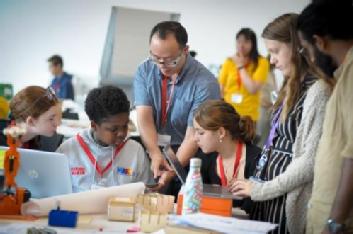 The project was also supported by student ambassadors from across the University; Drishti, David, Ana, Brij, Sheerah, Diya, Michelle, Gabe and Chinmay, giving the young visitors to our campus an experience of what studying in Higher Education is like. The Widening Participation team also gave a session providing information, advice and guidance on how they might enter university study. Throughout the week, young people therefore had experiences and interactions all the way from undergraduate level through the University hierarchy to the Dean of WMG.
The project was also supported by student ambassadors from across the University; Drishti, David, Ana, Brij, Sheerah, Diya, Michelle, Gabe and Chinmay, giving the young visitors to our campus an experience of what studying in Higher Education is like. The Widening Participation team also gave a session providing information, advice and guidance on how they might enter university study. Throughout the week, young people therefore had experiences and interactions all the way from undergraduate level through the University hierarchy to the Dean of WMG.
One participating student said: "Visiting the National Automotive Innovation Centre with Tata Motors has opened my eyes to what engineering is really like, and I would like to learn more about degree apprenticeships with the University of Warwick.”
Another said: "I would describe this programme to a friend as an unmissable and eventful opportunity which I would heavily recommend as it has boosted my skills and given me a greater insight into careers, apprenticeships and university as a whole which has inspired me to want to go to university.”
Professor Robin Clark, Dean of WMG said: “There is a clear pathway from this point to being professional engineers. There may be many routes – whether through an apprenticeship or through a taught degree programme – but the skills and experience needed for all those routes are the same: perseverance, determination, initiative, and curiosity. Having a product on display at this showcase also demonstrates plainly those qualities in the people who have made them.”
Dr Phil Jemmett, Widening Participation Coordinator at WMG said: "This work experience model has been in our minds since 2019 and this is the first time we've been able to run it at full scale. Students have been working with our engineers on group projects all week and have gone on a journey through engineering and rapidly prototyping equipment.
“Each challenge links to WMG research and to challenges in the real world that could help make our planet's future more sustainable. With the skills we have seen in these students this week I have no doubt that our STEM industry is in safe hands in the future. They have been amazing."
The University of Warwick's initiative reflects its dedication to providing equal opportunities in engineering education. By empowering less privileged local students and challenging misconceptions about the field, they are nurturing a diverse talent pool that will shape the future of engineering.
Find out more about WMG's Outreach programme here
Ends
Notes to editors
For media inquiries and interview requests, please contact:
Bron Mills, Bron.mills@warwick.ac.uk, +447824 540 720
WMG welcomes Indian Forum of Parliamentarians
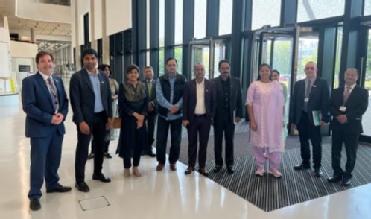 On Friday (16th June) Professor Robin Clark, Dean of WMG; and Professor David Greenwood, CEO of the High Value Manufacturing Catapult and Director of Industrial Engagement at WMG, were pleased to welcome guests from the Indian Forum of Parliamentarians.
On Friday (16th June) Professor Robin Clark, Dean of WMG; and Professor David Greenwood, CEO of the High Value Manufacturing Catapult and Director of Industrial Engagement at WMG, were pleased to welcome guests from the Indian Forum of Parliamentarians.
The delegation was made up of representatives from across various political parties including Shri Rajiv Pratap Rudy, Chair of the Forum of Parliamentarians; Ms. Vandana Chavan - National Congress Party; Shri Krishna Devarayalu Lavu - Yuvajana Sramika Rythu Congress Party; Shri Sujeet Kumar - Biju Janata Dal; Shri N K Premachandran - Revolutionary Socialist Party; and Shri Brijendra Singh - Bharatiya Janata Party.
The guests were particularly keen to hear more about WMG’s research and education programmes in electrification and mobility.
They were given a tour of the real-world demo site of the track system for the Coventry Very Light Rail flagship transport project, before Professor David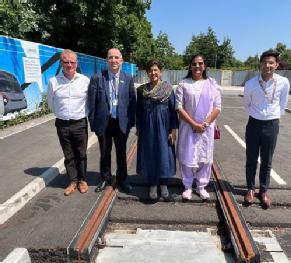 Greenwood led a tour of the Energy Innovation Centre (EIC) the home of WMG’s battery research.
Greenwood led a tour of the Energy Innovation Centre (EIC) the home of WMG’s battery research.
Finally the group heard more about the Warwick Moto project, where engineering students have been tasked with designing, building and racing an electric superbike.
The parliamentarians also had the opportunity to meet with Indian PhD students and researchers, studying and working at WMG.
Professor Robin Clark, Dean of WMG, explained: “ It was a pleasure to welcome the group of Indian Parliamentarians. Our relationship with India is long standing, and one that we value very highly.
“One example of our commitment is the strength of our relationship with IIT (Indian Institute of Technology) Kharagpur, whom in October 2022 we signed a Memorandum of Understanding (MoU) for a further five years, having first started in 2006.
We are increasingly appreciating the breadth of opportunity India presents, both in the academic and industrial spaces. As India is our main focus internationally at present, we expect to see more visits and more projects over the coming months and years!”
WMG announces new partnership with global engineering company
WMG, at the University of Warwick, has announced a new two year research partnership focusing on sustainable high-performance sealing materials.
Researchers at WMG’s Link opens in a new windowInternational Institute for Nanocomposites Manufacturing (IINM), led by Dr Chaoying Wan, will be working with experts at James Walker to develop the next generation of sealing compounds which will be compliant with future per- and poly- fluoroAlkyl substances (PFAS) regulations.
In February 2023, the European Chemicals Agency announced a proposal for the European Economic Area that will effectively lead to a ban on all PFAS materials, due to their persistence in the environment.
This research project will use high quantity techniques to develop and identify novel elastomer compounds that comply with proposed PFAS regulations, for use in critical industrial applications drawing on WMG’s expertise in elastomer and polymer technology.
The new technologies developed will have a high impact on a wide range of industries from transportation, oil/gas, semiconductor to hydrogen storage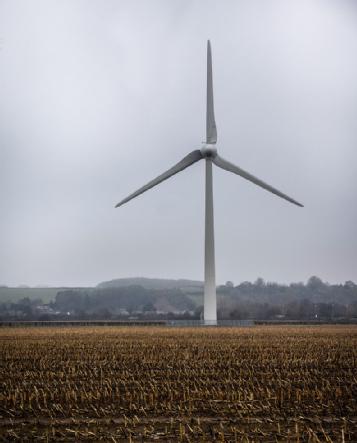 and wind turbines.
and wind turbines.
Conventional high performance sealing compounds rely on PFAS, as these materials are resistant to extremes of temperature and aggressive chemicals. PFAS are essential to the semi-conductor, aerospace, petrochemical, defence and nuclear industries for example, and there are currently no suitable replacement materials available. Alternative sealing materials are urgently needed to substitute PFAS.
Dr Mike Eason, Technical and Quality Director at James Walker commented: "Industrial dependence on PFAS elastomers is a global issue with supply chain impact already seen. I am delighted that we will work with Dr Wan and her team to identify and develop materials which will help industry be compliant with the proposed regulations. This partnership will accelerate James Walker’s development of seal materials for critical industry. WMG has small scale, advanced, mixing capability, with knowhow regarding nanofillers and polymer science that will allow James Walker to rapidly design, manufacture and screen bench-scale test formulations.
“I believe the combination of James Walker’s history and expertise in critical industrial sealing together with WMG’s state of the art capabilities will enable rapid development and commercialisation of materials. James Walker is committed to developing solutions to the PFAS regulations faced by global industry."
Dr Chaoying WanLink opens in a new window, Reader of Functional Polymers and Nanocomposites at WMG, University of Warwick explains: "Collaborating with James Walker to develop alternatives for PFAS seals is an important and exciting opportunity. Our elastomer research facility is supported by High Value Manufacturing Catapult CentreLink opens in a new window (HVMC), equipped with the latest technology, including a rubber process analyser (RPA) with wide temperature range - it is the only one in the UK, and one of only a few in the world with the capability to simulate dynamic elastomer performance at very low temperature.
“This function is extremely useful to compare differences in formulation design for applications such as high pressure or low temperature sealing. I am very much looking forward to working with the James Walker team on the development of new material options for high performance sealing applications and advancing our knowledge of polymer formulation and performance."
Find out more about WMG’s Nanocomposites research here: Nanocomposites (warwick.ac.uk)
Battery technology research collaboration initiated between OXECO and WMG, the University of Warwick
- OXECO and WMG at the University of Warwick will conduct a 15-month research programme into lithium-ion battery coatings
- Research is expected to advance next generation active materials and coating foils used to create electrodes
- The partnership aims to improve lithium-ion battery performance, longevity, and manufacturing
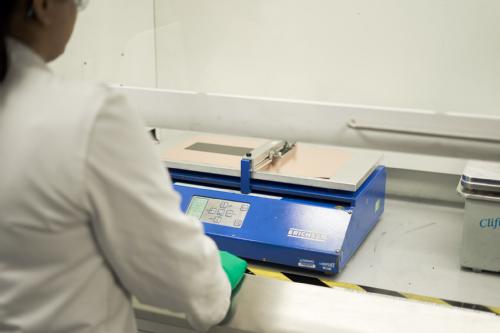 OXECO, a spin-out of the University of Oxford, has partnered with WMG at the University of Warwick, for a 15-month collaboration on lithium-ion battery technology. The partnership aims to advance the lithium-ion battery industry by leveraging WMG’s research on battery cell development and optimisation, alongside OXECO’s unique technology platform.
OXECO, a spin-out of the University of Oxford, has partnered with WMG at the University of Warwick, for a 15-month collaboration on lithium-ion battery technology. The partnership aims to advance the lithium-ion battery industry by leveraging WMG’s research on battery cell development and optimisation, alongside OXECO’s unique technology platform.
The research programme aims to enhance the performance, longevity, and ease of manufacturing of lithium-ion batteries by focusing on the preparation of active materials and coating foils used to create electrodes.
The programme is expected to yield transformative results in the improvement of current lithium-ion batteries and be a significant step towards the development of more efficient, reliable, and sustainable energy storage solutions.
This partnership will further OXECO’s aim to leverage innovative surface chemistry to accelerate our net-zero future. Jon-Paul Griffiths, founder and Chief Technology Officer at OXECO, commented that: “This is a remarkable opportunity to help steer the progress of battery technology - a crucial industry for the realisation of a sustainable energy economy. WMG has exceptional proficiency and credibility in battery research, coupled with the ability to manufacture from bench to pilot scale.
"This marks the initial phase of our efforts towards the integration of ONTO™ chemistry into lithium-ion batteries, and we are also delving into other domains of our chemistry for diverse applications in batteries, such as separator membranes. Our team is dedicated to forging a path towards cutting-edge technological advancements that will shape the future of energy storage solutions.”
WMG has an international reputation for working successfully with industry, with a history of partnering with pioneering entities, including Lotus, Aston Martin, JLR, BAE Systems, IBM, and Plug and Play, as well as the latest technology innovators.
Dr Mark Copley, Chief Engineer in WMG's Electrochemical Materials and Manufacturing team, concluded: “We are excited to be partnering with OXECO. This collaboration will draw on the University’s extensive expertise in battery technologies and OXECO’s chemistry to improve battery performance and longevity and help the global transition to sustainable power solutions through innovative research and training.”
About OXECO
OXECO is a chemistry technology company that designs, develops, and manufactures thin coatings and materials for the transport and clean technology sectors. The company’s core innovative technology controls the way that surfaces behave using cutting-edge carbene chemistry. This technology was born in the University of Oxford’s Department of Chemistry and developed over more than two decades.
AI triaging of shrapnel wounds developed through UK and Ukraine partnership
Researchers in the UK and Ukraine are teaming up to develop artificial intelligence (AI) that will help treat those wounded by shrapnel.
Scientists at WMG at the University of Warwick and the Kharkiv National University of Radio Electronics (NURE) in Ukraine are developing AI software that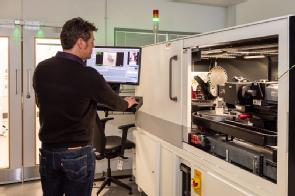 will help medics understand which patients require immediate treatment, due to life-threatening wounds that might not be obvious with the naked eye. The state-of-the-art technology enables users to feed data from a CT scan to a computer programme, which will help medics make quick decisions on which of the injured require most immediate treatment.
will help medics understand which patients require immediate treatment, due to life-threatening wounds that might not be obvious with the naked eye. The state-of-the-art technology enables users to feed data from a CT scan to a computer programme, which will help medics make quick decisions on which of the injured require most immediate treatment.
The project is one of 33 being discussed at the House of Lords this evening, to mark the one-year anniversary of the Twinning initiative – an institution-to-institution collaboration model which allows universities around the world to support their Ukrainian counterparts in real, concrete ways. It is funded by a £5m grant from Research England, administered by Universities UK International (UUKi).
Professor Mark Williams, WMG at the University of Warwick, said: “A huge problem for medics dealing with many severely injured people at the same time is the rapid identification of life-threatening injuries so they can prioritise who needs emergency surgery soonest. This is why we’re developing software with the team in Kharkiv to help address this issue. As well as being useful in other emergency situations such as earthquakes, the research is also applicable to doctors in trauma wards – already stretched by pressures experienced by the NHS – who need to triage patients quickly.
“For WMG’s part of the project, we will be creating phantom models using 3D imaging – replicas of human anatomy and shrapnel wounds. These will act as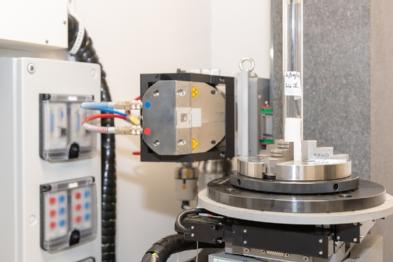 ‘test objects’, which experts in computer science can use to calibrate their technology and AI programme.
‘test objects’, which experts in computer science can use to calibrate their technology and AI programme.
“It is very exciting to be able to bring our expertise in Additive Manufacture at WMG to deliver a rapid solution to such an important humane need, allowing us to truly exploit the incredible advantages in speed of response and material complexity offered by this technology.”
Anastasiya Chupryna, coordinator of Radio Electronics-Warwick Allied Research and Development (REWARD) project at NURE said: “We would like to thank our partner Warwick University for supporting us in joint research activities. Within this project NURE and Warwick University will be able to solve extremely important problems. We believe that practical results of these projects will demonstrate significant impact and innovation solutions for society.”
WMG is considered the leading international role model for successful collaboration between academia and the public and private sectors by successive UK Governments. The WMG specific research is funded by a £179k grant from UUKi.
More here https://www.ukri.org/news/research-england-invests-in-uk-ukraine-university-twinning-scheme/
Ends
University of Warwick press office contact:
Annie Slinn
Communications Officer | Press & Media Relations |
Email: annie.slinn@warwick.ac.uk
Pushing the limits of battery research with nickel-rich chemistries
New research has shown that understanding how oxygen participates in energy storage is critical for developing higher energy density batteries, in a new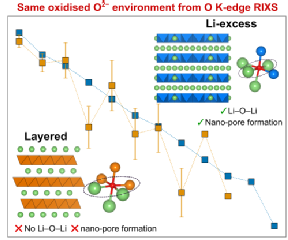 paper published by experts at WMG, at the University of Warwick.
paper published by experts at WMG, at the University of Warwick.
Using advanced X-ray techniques, researchers at WMG, together with the Faraday Institution's FutureCat consortium, have obtained new insights into the oxygen redox activity in conventional ni-rich cathodes, which will help to deliver improved electric vehicle performance.
Range anxiety is a key concern of many potential EV buyers, but range is steadily improving as battery technology and research evolves. The Faraday Institution’s Next Generation Lithium-Ion Cathode Materials project, FutureCat, aims to develop understanding of existing and newly discovered cathode chemistries to deliver improved EV performance, whilst considering sustainability.
Professor Louis Piper, from WMG at the University of Warwick, who led the research explained: “Transitioning to electrification requires integrating advanced materials science into battery processing to develop cheaper, safer, faster and better batteries, which is the focus of our research.”
The battery field is moving to increasing nickel contents in cathodes to meet the Government’s stringent EV 2030+ targets. These roadmaps assume successful strategies in material development to allow cathodes like W-LNO to operate at high voltages without degrading. This work provides the platform towards realising that goal by better understand the redox mechanisms (i.e., the reactions that enable charging/discharging the battery) at high voltage operation.
The study employed advanced x-ray characterisation techniques at the Diamond Light Source in Oxford and at WMG. The team at WMG utilised novel in-house x-ray absorption spectroscopy which enabled researchers to look at the electrode redox process of the battery cathodes after careful disassembly. Researchers were surprised to find that the oxidised oxygen species had the same characteristics as another group of Li-ion battery cathodes, Li-excess transition metal oxides. Reconciling how the same oxidised oxygen environment exists in both conventional and Li-excess cathodes is critical for unlocking how to develop the next generation of cathodes.
Professor Piper adds: “This work highlights how large-scale collaborative fundamental studies are needed even for supposedly ‘known’ systems.”
WMG will be continuing with further studies in this field, supported by the Faraday Institution, for the benefit of cathode battery manufacturers.
A link to the published article can be found here:
https://journals.aps.org/prxenergy/pdf/10.1103/PRXEnergy.2.013005
WMG and Conigital receive UK government funding for ambitious self-driving research project
WMG, at the University of Warwick, and Conigital, have been awarded a share of £81 million in joint UK government and industry support to develop self-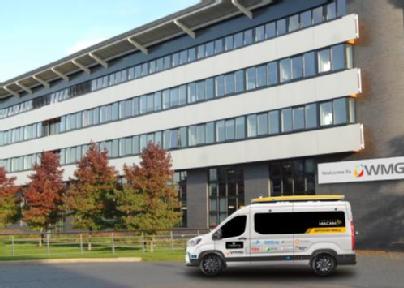 driving transport technology.
driving transport technology.
WMG is part of a consortium, led by Conigital, including the NEC Birmingham, Direct Line Group, Coventry City Council, Solihull Metropolitan Borough Council, Coventry University, dRisk, IPG Automotive and West Midlands Combined Authority.
The project entitled Multi-Area Connected Automated Mobility (MACAM) has been awarded a total of £16.6 million by the Centre for Connected and Autonomous Vehicles (CCAV), to establish a remote driving control hub, to oversee self-driving vehicles operating in Solihull and Coventry.
To make self-driving vehicle operations commercially viable, and offset current technology and driver costs, they must operate as efficiently as possible. This project therefore proposes a multi-area, multi-application self-driving operation, underpinned by Conigital’s 5G-based, central, Remote Monitoring Teleoperation (RMTO) system.
A mixed fleet of 13 self-driving vehicles will be moving passengers and light freight (such as mail and parcels for delivery) between Birmingham International Rail Station and Birmingham Business Park, and between Coventry railway station and Coventry University campus. These routes have a known, current, need for alternative transport and offer an ideal platform from which to develop commercial self-driving solutions.
New mobility technology and services will lead to safer, greener and more efficient transportation for both people and goods. MACAM will build on the foundations set by other projects including the WMG-led Midlands Future Mobility consortium.
Midlands Future Mobility is installing infrastructure on 200+ miles of West Midland’s roads to enable trials of Connected and Automated Mobility (CAM) solutions. This includes CCTV, weather stations, communications units, and highly accurate GPS coverage. The technology developed on the route will make UK roads safer and allow for more predictable goods delivery and journey times.
Transport Secretary Mark Harper said: “Self-driving vehicles including buses will positively transform people’s everyday lives – making it easier to get around, access vital services and improve regional connectivity.
“We’re supporting and investing in the safe rollout of this incredible technology to help maximise its full potential, while also creating skilled jobs and boosting growth in this important sector.”
WMG’s expertise on MACAM focuses specifically on the safety of the self-driving vehicles, as David Evans, Lead Engineer at WMG, University of Warwick explains: “Researchers and engineers at WMG will be providing trial support and undertaking related research in line with industry standards and best practice, required for the operator(s) to conduct the automated vehicle deployments safely and securely.”
Director of Intelligent Vehicles Research at WMG, University of Warwick, Professor Mehrdad Dianati, adds: “We have seen remarkable progress in Connected and Automated/Autonomous Mobility Technologies in recent years. It is paramount to pave the way for commercialising these technologies, particularly in the promising near future application areas such as the ones the MACAM consortium aims for. We are excited to be a part of this journey to transfer the knowledge we have developed through our fundamental research to help this unique consortium of UK companies, universities and local authorities to create new economic development opportunities for the region and the country.”
Don Dhaliwal, CEO of Conigital commented: “We are delighted to strengthen our links with WMG and other partners to accelerate a joint vision of Autonomous, Connected, Electric & Shared (ACES) fleets to address cities and businesses needs to Go Zero, Zero Accidents, Zero Emissions and Zero Congestion whilst creating new jobs via delivery of sustainable, accessible commercial CAM (Connected Autonomous Mobility) services.”
The methodologies and outcomes generated by the MACAM project will directly benefit teaching, research, and further collaboration with industry at WMG, developing future UK expertise and capability.
Read more about WMG’s Intelligent Vehicles research here and Conigital here
Read more about WMG’s MSc Smart, Connected and Autonomous Vehicles (SCAV) here.
Read more about the latest Centre for Connected and Autonomous Vehicles (CCAV) funded self-driving projects here.
ENDS
Notes to Editors
The government is awarding almost £42 million to seven projects through the Centre for Connected and Autonomous Vehicles (CCAV) Commercialising Connected and Automated Mobility (CAM) competition. Industry consortia will match the public grant to around £81 million and will be expected to demonstrate a sustainable commercial service by 2025.
The Multi-Area Connected Automated Mobility project is part of CCAV’s Commercialising CAM Deployments Competition (CCAMD).
The Commercialising CAM programme is funded by the Centre for Connected and Automated Vehicles, a joint unit between the Department for Transport and the Department for Business and Trade and delivered in partnership with Innovate UK and Zenzic.
The £40m CCAMD competition was launched in May 2022 to support the delivery of early commercialisable Connected and Automated Mobility Services and is part of the Government’s vision for self-driving vehicles. Connected and automated mobility 2025: realising the benefits of self-driving vehicles.
Multi-Area Connected Automated Mobility– Conigital
£8.3 million awarded by government, matched by industry to a total £15.2 million. This project looks to establish a self-driving vehicle operation around various parts of the West Midlands, underpinned by a centralised, Remote Monitoring Teleoperation (RMTO) centre. The RMTO centre will be where the project’s self-driving vehicles are monitored and (when required) controlled from, using 5G connectivity. The project aims to make self-driving vehicle operations commercially viable, and offset current technology and driver costs.
Historic devolution agreement signed at WMG
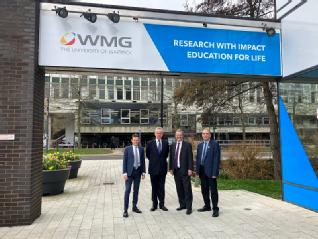 Professor Robin Clark, Dean of WMG at the University of Warwick, was pleased to welcome Levelling Up Secretary, Michael Gove and West Midlands Mayor, Andy Street on Monday (20 March).
Professor Robin Clark, Dean of WMG at the University of Warwick, was pleased to welcome Levelling Up Secretary, Michael Gove and West Midlands Mayor, Andy Street on Monday (20 March).
The Levelling Up Secretary and West Midlands Mayor signed a landmark deeper devolution deal for the region, marking a seismic shift in power, funding and responsibility from Whitehall to the region, at a ceremonial event that took place at WMG at the University of Warwick.
The deal announced in the Spring Budget puts more cash and power in the hands of local leaders to invest in the priorities that local communities truly care about, such as better bus and train services, skills and housing.
A new long-term funding settlement will enable the Mayor and local councils to plan for the long term, with certainty, and unlock tangible benefits for almost three million people living in the area.
Levelling Up Secretary Michael Gove said: “Visionary local leaders like Andy Street understand the needs of their areas better than decision-makers in Whitehall - that is why it is vital that we put more power and control in their hands.
“This deal goes further than we’ve ever gone before. It will give the Mayor unprecedented power to spend on local priorities and more control over transport, skills and housing – the things people truly care about.
“Today marks a bold new frontier in devolution in this country, and it’s fantastic to see the West Midlands right at the forefront.”
Stuart Croft, Vice Chancellor of the University of Warwick, which hosted the Levelling Up Secretary's visit, said: “It is good to be able to support the hard work across our region that has led to this agreement. We’re proud to play an active role in driving business growth and innovation in the West Midlands, whether that’s through our apprenticeship programmes, support for start-ups, or our close partnerships with industry across the region.
"Our world leading research into new green energy and technology is an example of where we’re not only developing new businesses, skills, and jobs, but also helping the UK to reach its net zero goals.”
Professor Robin Clark, Dean of WMG at the University of Warwick, added: “It was a pleasure to welcome the Levelling Up Secretary and the West Midlands Mayor, and we were proud to provide the location for the signing of this landmark devolution agreement.
“Before the official signing, I had the opportunity to show Mr Gove our 3xD driving simulator for autonomous vehicle research, and to explain more about WMG’s commitment to developing new engineering and manufacturing skills to help bridge the gap between academia and industry.”
Read more about the Deeper Devolution Deal.
EV-elocity project recognised at prestigious engineering awards
The EV-elocity project, involving engineers and researchers from WMG at the University of Warwick, has won a Collaborate to Innovate Award, from The Engineer magazine, in the Energy & Environment category.
The Awards celebrate the very best engineering collaborations and innovations across the UK.
EV-elocity is a research and development project looking at increasing the uptake of electric vehicles by helping consumers to monetise their investment using vehicle-to-grid (V2G) innovation.
With vehicle-to-grid (V2G) technology, electric vehicle (EV) batteries could store electricity - when there is an abundant supply - to power homes and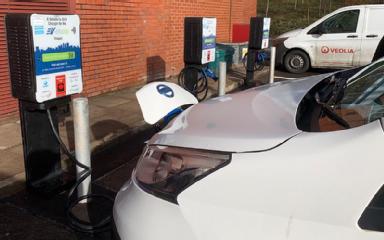 businesses and to discharge it back to the national grid when it is most needed.
businesses and to discharge it back to the national grid when it is most needed.
Researchers at WMG developed a new model that quantified the degradation in the vehicle’s battery because of different EV charging strategies. The model highlighted that it was possible to manage the battery to mitigate much of the degradation and it was possible to even extend battery life through proper control and battery conditioning.
This enables better use of renewable energy, lower carbon footprint, less pressure on the grid and financial savings, which can help electric vehicle owners pay back their investment.
The EV-elocity project has deployed V2G chargers in a range of locations across England as part of large-scale trials to gain technical, customer and commercial insights on the emerging technology. It is also investigating if, and how, additional use from V2G charging may affect EV battery life.
Professor of Systems Modelling, James Marco, explains: “One of the unique aspects of EV-elocity, was the integration of EV technology with future energy infrastructure, such as vehicle-to-grid, to demonstrate at scale how novel methods of EV charging can provide multiple benefits for both the consumer and the environment.”
The project, led by Cenex, a not-for-profit consultancy specialising in delivery of low carbon vehicles and energy infrastructure projects also involves the Universities of Nottingham and Warwick; Leeds and Nottingham City Councils; and CrowdCharge, a platform that integrates and optimises smart electric vehicle charges.
EV-elocity is funded by the Department for Business Energy and Industrial Strategy (BEIS) and the Office for Zero Emission Vehicles (OZEV), in partnership with Innovate UK, part of UK Research and Innovation.
Read more about the award-wining EV-elocity project here: EV-elocity Project | vehicle-to-grid (V2G) innovation with electric vehicles
Warwick University will help Bolivia become the “energy cell of the world”
Historic agreement sees the university and Bolivia collaborate on lithium battery project and provide scholarships for Bolivian students
The University of Warwick is set to help Bolivia become a world leader in renewable energies and electric vehicles, thanks to a historic partnership on lithium battery research with the Bolivian Government.
The partnership, funded by the UK’s Foreign Commonwealth & Development Office (FCDO), will help develop lithium’s application as a power source in everything from electric cars to mobile phones.
Bolivia’s vast salt flats harbour an estimated 39 million tonnes of lithium reserve, positioning the country to be one of the world’s most important suppliers in the coming decades. The projects supports Bolivia’s ambition to provide 40% of the world’s supply of lithium by 2030. It will see Bolivia be at the forefront of lithium value chain, lead to higher paying employment and industry and a transition away from simple extraction and exploitation of raw materials.
Several master’s degree scholarships will also be offered to Bolivian students and the University’s WMG will link up with Yacimentos de Lito Bolivianos,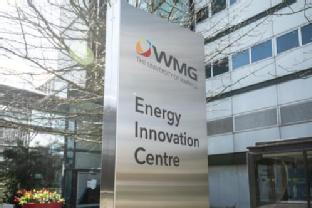 Bolivia’s lithium mining institution in a multi-year research project to improve the understanding and possibilities for lithium battery technology.
Bolivia’s lithium mining institution in a multi-year research project to improve the understanding and possibilities for lithium battery technology.
David Rutley, Minister for the Americas and Caribbean at FCDO was present at the signing of the agreement and said: “This is a landmark partnership between Bolivia and Warwick – one of our great UK universities. This collaboration will help unlock the possibilities of battery technology in a new era of clean energy. The partnership will also address the drawbacks associated with using fresh water in the extraction process – making the industry more sustainable and less environmentally damaging.”
“This agreement demonstrates the potential for scientific and technological cooperation of our two great nations. It could help see Bolivia become the energy cell of the world.”
Professor Mike Shipman, University of Warwick’s Pro-Vice- Chancellor (International), said: “We are excited to be partnering with the Ministry of Hydrocarbons and Energies and Yacimentos de Litio Bolivanos. This collaboration will draw on the University’s extensive expertise in battery technologies and build new capabilities in Bolivia and help the global transition to sustainable power solutions through innovative research and training”.
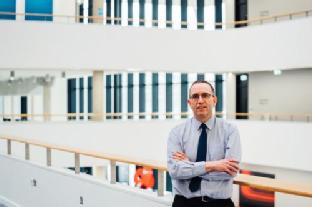 Professor Robin Clark, Dean of WMG at the University of Warwick said: “This opportunity is one that will help ensure WMG stays at the forefront of global battery research and education. It has been a pleasure to share our work with our Bolivian partners and we hope that this is the start of a long and productive relationship.”
Professor Robin Clark, Dean of WMG at the University of Warwick said: “This opportunity is one that will help ensure WMG stays at the forefront of global battery research and education. It has been a pleasure to share our work with our Bolivian partners and we hope that this is the start of a long and productive relationship.”
Notes to editors:
For more information contact Tania Corbett, Media Relations Manager at Warwick University: tania.corbett@warwick.ac.ukLink opens in a new windowLink opens in a new window | Mob: +44 (0) 7824 540 727. General and out of hours press office number 02476 151 512
Interviews available in Spanish and English.
The research project between Warwick/WMG and Bolivia’s Yacimentos de Lito Bolivianos YLB will focus of synthesis and characterization of battery cathode materials derived from lithium extracted from the Salar de Uyuni. The partnerships will combine expertise on battery manufacturing and characterization between the two groups. Access to the sources of lithium supplies is critical for the development of active materials within Li-ion battery and requires the UK to develop strategic partnerships internationally.
